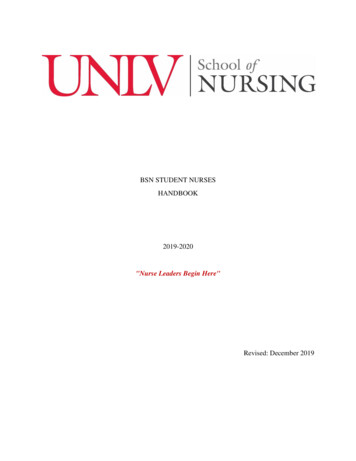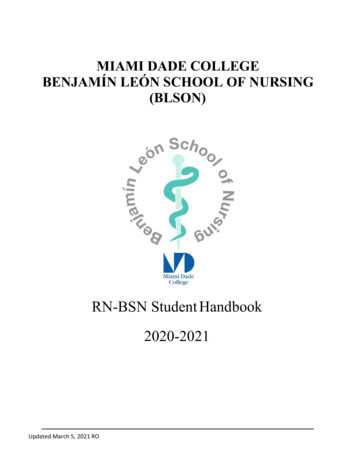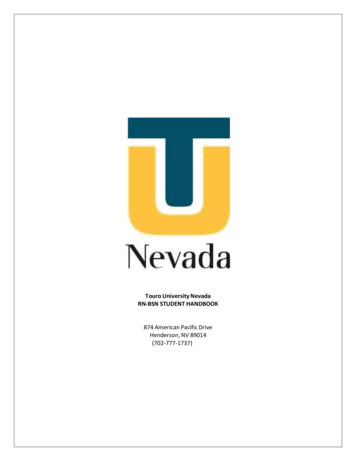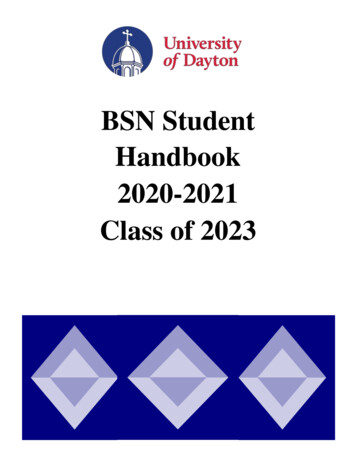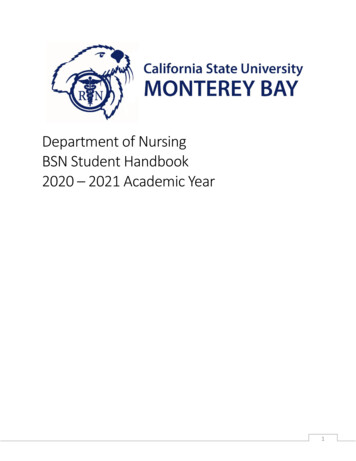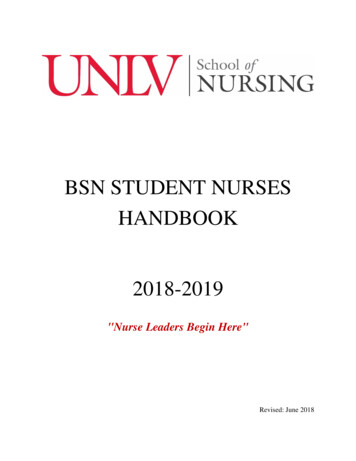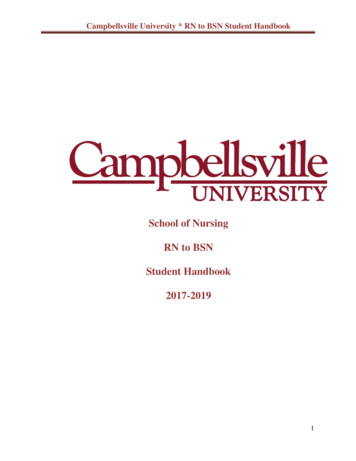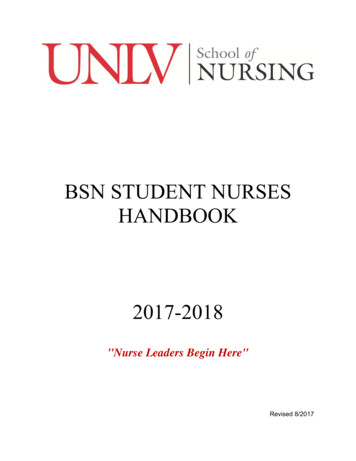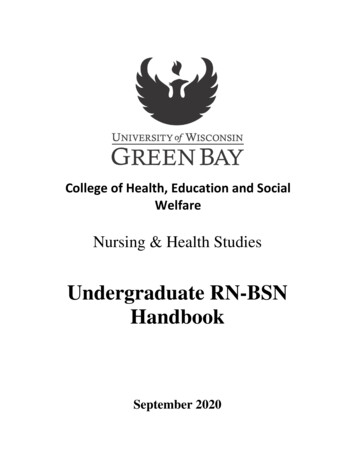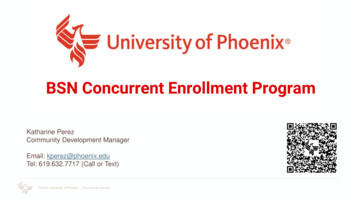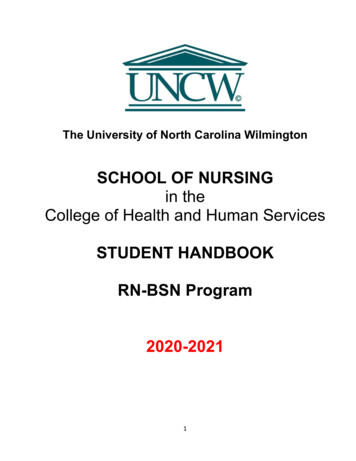
Transcription
The University of North Carolina WilmingtonSCHOOL OF NURSINGin theCollege of Health and Human ServicesSTUDENT HANDBOOKRN-BSN Program2020-20211
UNIVERSITY of NORTH CAROLINA WILMINGTONSCHOOL of NURSING RN-BSN PROGRAM STUDENT HANDBOOKPREFACEThe purpose of this Student Handbook is to assist in understanding the policies, procedures, and general informationspecific to the RN-BSN program of the University of North Carolina Wilmington (UNCW) School of Nursing (SON).The information in this guide is a supplement to the published current issues of The University of North CarolinaWilmington Undergraduate Catalogue, The University of North Carolina Wilmington Graduate Catalogue, and theUniversity of North Carolina Wilmington Student Code of Student Life.Successful matriculation and graduation from the RN-BSN program requires adherence to all policies, procedures,and regulations as stipulated by both the University of North Carolina Wilmington and the UNCW School ofNursing. If you have questions regarding requirements or policies, do not hesitate to refer them to the AssistantDean of the CHHS Student Success Center, Academic Advisor, Program Coordinator, SON Director, or otherappropriate person(s).The University of North CarolinaWilmington School of Nursing StudentServices Office – Room 1009 McNeill Hall601 South College RoadWilmington, NC 28403-5995Telephone: 910-962-3208Fax: 910-962-4921Email: chhs@uncw.eduThe University of North Carolina Wilmington is committed to and will provide equality of educationaland employment opportunity for all persons regardless of race, sex (such as gender, marital status,and pregnancy), age, color, national origin (including ethnicity), creed, religion, disability, sexualorientation, political affiliation, veteran status or relationship to other university constituents—exceptwhere protected status represents a bona fide educational or occupational qualifications or wheremarital status is a statutorily established eligibility criterion for state-funded employee benefitprograms. (The University of North Carolina Wilmington Undergraduate Catalogue 2019-2020).2
Table of ContentsSECTION I. 6OVERVIEW AND HISTORY OF THE SCHOOL OF NURSING. 6MISSION STATEMENT . 8UNCW VISION STATEMENT . 8UNCW MISSION STATEMENT. 8CHHS VISION STATEMENT . 8CHHS MISSION STATEMENT. 8SCHOOL OF NURSING VISION STATEMENT . 8SCHOOL OF NURSING MISSION STATEMENT. 8CONCEPTUAL FRAMEWORK . 9SECTION II. 11BACCALAUREATE PROGRAM: BACHELOR OF SCIENCE IN NURSING BSN . 11STUDENT LEARNING OUTCOMES . 11APPLICATION/ADMISSION PROCESS. 11RN-BSN PROGRAM CORE PERFORMANCE STANDARDS. 12RN-BSN PROGRESSION POLICIES . 13ONLINE COURSE CLASSROOM POLICIES . 14GENERAL COURSE POLICIES AND EXPECTATIONS . 14Course Policies . 14Course Expectations. 14GRADING POLICIES . 15Grading Scale: RN-BSN Programs . 15SECTION III. 16GENERAL PROCEDURES AND POLICIES. 16NORTH CAROLINA RESIDENCY . 16COURSE DESCRIPTIONS . 16DISTANCE LEARNING . 16ORIENTATION. 17GRADE APPEAL PROCEDURE. 17ACADEMIC ADVISEMENT . 18Advisor to the School of Nursing . 18Meeting with Your Advisor on a Regular Basis . 18Contacting Your Advisor . 18How to Develop a Plan of Study . 18How to Change Advisors . 19Academic Concerns. 19Knowledge of the School of Nursing Policies . 19RESOLVING ACADEMIC CONCERNS . 19CODE OF ETHICS . 20Student Standards of Conduct . 20Academic Conduct. 20Professional Conduct. 20CONFIDENTIALITY STATEMENT . 22INFORMATION SECURITY POLICY . 23Policy . 23Scope: . 23SAMPLES OF BREACHES OF CONFIDENTIALITY. 24RESPONSIBLE USE OF DIGITAL AND SOCIAL MEDIA . 25Responsible Social Media Use by Nursing Students . 253
Guidelines for Online Professional or Personal Social Media Usage . 25ACADEMIC HONOR CODE . 26EQUAL OPPORTUNITY, DIVERSITY AND UNLAWFUL HARASSMENT . 26UNDERGRADUATE PROGRAM CIVILITY STATEMENT. 26EMPLOYMENT OF STUDENTS . 27LITERARY FORMAT. 27INSTITUTIONAL REVIEW BOARD PROCESS (IRB). 27SUBSTANCE ABUSE POLICY . 27Policy . 28Rationale . 28Procedure . 28APPENDIX A . 31Student’s Consent Form . 31APPENDIX B . 32Notice of Drug Testing . 32UNIVERSITY EMERGENCY MANAGEMENT PLAN INCLEMENT WEATHER . 33DISMISSAL POLICIES . 33GENERAL POLICIES ON ADVANCED PLACEMENT, WITHDRAWAL, TRANSFER CREDIT . 33CLASS ATTENDANCE POLICIES. 33TIME LIMITS FOR COMPLETION OF PROGRAM REQUIREMENTS. 34STUDENT REPRESENTATION AND ORGANIZATIONS . 34RN-BSN COUNCIL AND COMMITTEES. 34Association of Nursing Students . 34American Assembly for Men in Nursing . 34The Wilmington Area Chapter of Nurses Christian Fellowship (NCF) of UNC Wilmington . 35NURSING HONOR SOCIETY . 35STUDENT SCHOLARSHIPS . 36STUDENT AWARDS. 36DEPARTMENTAL HONORS . 364
SCHOOL OF NURSINGWelcome from the DirectorCome soar with us and make the world a healthier place.Good health is priceless.Generosity is always returned to those giving priceless gifts.Enjoy each day knowing the profession you have chosen is rewarding, honored, and respected.Thank you for considering the School of Nursing as the place that will help you soar! The School of Nursing (SON)is one of three schools in the College of Health and Human Services. We are the largest school, with multiple degreeprograms and almost 2,275 students. Our RN-BS nursing program, as well as our Clinical Research graduate andundergraduate programs, are entirely online. Our MS programs and DNP program are hybrid programs that areprimarily online.Our nursing programs are accredited by the American Association of Colleges of Nursing Commission on CollegiateNursing Education and our NCLEX and master’s certification examination pass rates are at or near 100%. Retentionand satisfaction of students are well above the expected norms. Our RN-BSN online nursing program has beenranked 8th by Online U.Our Clinical Research programs provide students with education, training and experience in the field of clinicalresearch. Multiple careers in the field of clinical science are available to students after graduation. Many graduateswork in the drug development industry with a broad range of responsibilities including, but not limited to, managing andmonitoring clinical trials in the pharmaceutical industry.We invite you to explore our school, our programs, and our faculty on our website to find what is right for you. Wewant you to find a profession you love where you will always feel that you can soar each day to new heights. Ourschool is not a destination but a journey to an opportunity to touch the lives and the health of our community, state,and world.Again, welcome to the School of Nursing. We invite you to soar in healthwith us. Be well and enjoy each day,Linda HaddadDirector and IrwinBelk DistinguishedProfessor5
SECTION ITHE UNIVERSITY OF NORTH CAROLINA AT WILMINGTON SCHOOL OFNURSINGOverview and History of the School of NursingIn the early 1960s, the New Hanover County Commissioners consolidated James Walker Memorial Hospitaland Community Hospital creating the New Hanover Memorial Hospital, which has since become NewHanover Regional Medical Center (NHRMC). With the acquisition of Cape Fear Hospital, the currentdesignation as New Hanover Health Network (NHHN) evolved. The New Hanover Memorial Hospital Board ofDirectors discontinued the diploma nursing programs that had existed at James Walker Memorial Hospitaland Community Hospital. In response, county officials requested that Wilmington College establish a twoyear associate degree program in nursing. The first Wilmington College nursing class graduated with anAssociate of Arts degree in nursing in 1967.During the 1970s, UNCW initiated plans for a Bachelor of Science program with a concentration in professionalnursing. In 1980 a baccalaureate program was recommended to meet the needs of both first-time nursingstudents and registered nurses wishing to earn a four-year degree. In 1984, the UNC Board of Governorsapproved establishing the UNCW baccalaureate program in nursing. The curriculum received initial (provisional)approval from the Board of Nursing in June 1984. Having acquired approval from the University of NorthCarolina System and the North Carolina Board of Nursing, UNCW established the School of Nursing (SON) onJuly 1, 1984.Authorization to plan the graduate program was granted by the University of North Carolina GeneralAdministration in Fall 1997, with authorization to establish the program in July 1998. The first cohort ofstudents (ten full-time and ten part-time) was admitted in Fall 1998. The planning year and the first two years ofthe program were supported partially by grants totaling over one million dollars from the United StatesDepartment of Health and Human Services and the Cape Fear Memorial Foundation. The first Master ofScience in Nursing class of nine students graduated in May 2000. In 2004, continuing accreditation wasgranted for the baccalaureate and MSN programs by the NLNAC for the maximum period of eight years(2012). In 2004, the SON admitted three students into the inaugural class of the Master of Science in Nursing –Nurse Educator Option (MSN-NE). In response to the critical shortage of registered nurses in professionalpractice, and the need to produce more faculty to accommodate increased student enrollment, the NurseEducator Option was approved as the second option in the MSN program.In June 2003, the Office of the President of the University of North Carolina approved the intent to plan theBachelor of Science in Clinical Research (non-nursing major). The following year in Fall 2004, a cohort of fivestudents commenced the program of study. This inaugural class of five students graduated in May 2006 andthe second and third cohorts graduated nine in May 2007 and nine in May 2008 respectively. Enrollment hasincreased steadily in the CLR program and is projected to continue to increase for the foreseeable future.This initiative was a collaboration of the UNCW SON and Pharmaceutical Product Development, Inc. (PPD). Inthe Spring of 2010, the General Administration of the University of North Carolina approved the proposal tobegin a Master of Science Degree in Clinical Research Management and Product Development and will enrollthe first students in January 2011.The baccalaureate degree program in nursing at the UNCW School of Nursing is accredited by th
year associate degree program in nursing. The first Wilmington College nursing class graduated with an Associate of Arts degree in nursing in 1967. During the 1970s, UNCW initiated plans for a Bachelor of Science program with a concentration in professional nursing. In 1980 a baccalaureate program was recommended to meet the needs of both first .
